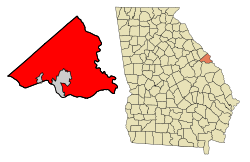Sand Hills Historic District
The Sand Hills Historic District in Augusta, Georgia is a historic district which was listed on the National Register of Historic Places in 1997.[1] The district included 334 contributing buildings and a contributing site in a 231 acres (0.93 km2) area roughly bounded by Monte Sano and North View Aves., Mount Auburn St., Johns Rd., and the Augusta Country Club.[1]
Sand Hill Historic District | |
Homes in 2500 block of Mt. Auburn Avenue, in 2015 | |
 | |
| Location | Roughly bounded by Monte Sano and North View Aves., Mount Auburn St., Johns Rd., and Augusta Country Club., Augusta, Georgia |
|---|---|
| Coordinates | 33.483333°N 82.020278°W |
| Area | 231 acres (0.93 km2) |
| Built | 1874 |
| Architectural style | Colonial Revival, Mission/spanish Revival, Tudor Revival |
| NRHP reference No. | 97000754[1] |
| Added to NRHP | July 9, 1997 |
It is also known as Elizabethtown Historic District.
The district "is a historic African-American neighborhood located in the western part of Augusta adjacent to the National Register-listed Summerville Historic District. The neighborhood is laid out in an incomplete grid pattern and consists of a historic African-American cemetery, residential buildings, commercial buildings, community landmark buildings, and landscaped yards and median of a road. The neighborhood's development is closely associated with the development of the Summerville neighborhood. The Sand Hills Historic District has statewide significance in the areas of Architecture, Ethnic Heritage: African American, Community Planning and Development, and Landscape Architecture."[2]
It is roughly bounded by Monte Sano Ave., North View Avenue, Mount Auburn Street, Johns Road, and the Augusta Country Club.[2]
It borders on the Augusta Country Club, which itself borders on the Augusta National Golf Club.
See also
- Sand Hills region of Georgia and the Carolinas
- Sand Hills cottage architecture
References
- "National Register Information System". National Register of Historic Places. National Park Service. November 2, 2013.
- Griff Pollaty; Amy Pallante (May 1997). "National Register of Historic Places Registration: Sand Hills Historic District". National Park Service. Retrieved November 7, 2019. With accompanying 22 photos from 1996
| Wikimedia Commons has media related to Sand Hills Historic District. |
